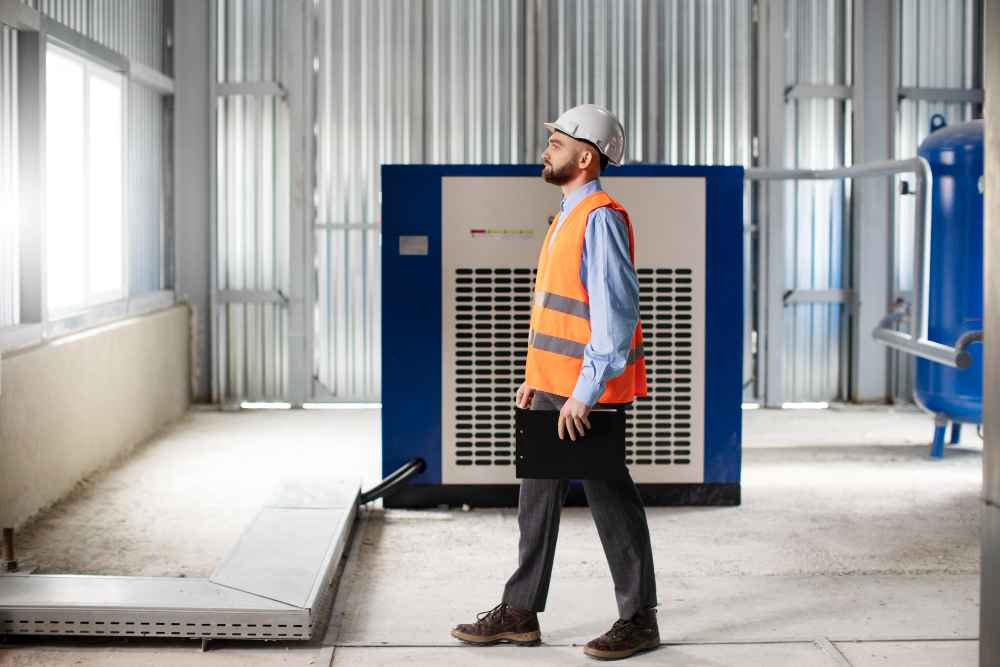In today’s modern world, HVAC (Heating, Ventilation, and Air Conditioning) systems play a vital role in providing comfort and maintaining optimal indoor environments.
As the demand for efficient HVAC systems continues to grow, the need for skilled professionals in the field of HVAC engineering is on the rise. Pursuing a master’s degree in HVAC engineering offers individuals the opportunity to gain advanced knowledge and expertise in this specialized field.
This article explores the various aspects of obtaining a master’s degree in HVAC engineering, including program details, duration, cost, career prospects, and more.
What is HVAC Engineering?

HVAC engineering encompasses the design, installation, operation, and maintenance of heating, ventilation, and air conditioning systems. These systems are essential for maintaining indoor air quality, temperature regulation, and overall occupant comfort in residential, commercial, and industrial settings.
HVAC engineers are responsible for designing efficient and sustainable HVAC systems, conducting feasibility studies, performing energy audits, and ensuring compliance with safety and environmental regulations.
HVAC Engineering Master’s Degree
Overview of a Master’s Degree in HVAC Engineering
A master’s degree in HVAC engineering provides students with a comprehensive understanding of HVAC systems, their design principles, and advanced engineering concepts. This degree equips graduates with the skills and knowledge necessary to tackle complex HVAC challenges and contribute to sustainable building practices.
Pursuing a master’s degree offers several advantages, including increased job prospects, career advancement opportunities, and the ability to specialize in specific areas of HVAC engineering.
Duration and Time Commitment
The average duration of a master’s degree in HVAC engineering typically ranges from 1.5 to 2 years, depending on the program structure and whether students enroll on a full-time or part-time basis.
Full-time programs generally require a higher time commitment, while part-time options provide flexibility for working professionals who wish to balance their studies with other commitments. It’s important to consider the time required for coursework, research, and any additional practical training or internships.
Curriculum and Coursework
A master’s degree program in HVAC engineering covers a wide range of topics to provide students with a comprehensive understanding of the field. Core courses often include subjects such as thermodynamics, fluid mechanics, heat transfer, HVAC system design, energy modeling, and sustainable building practices.

Additionally, students may have the opportunity to choose elective courses that align with their specific interests or career goals, such as indoor air quality, renewable energy systems, or HVAC controls. Many programs also emphasize hands-on practical training through laboratory sessions and real-world projects.
Admission Requirements
To gain admission to a master’s degree program in HVAC engineering, applicants typically need to meet certain academic prerequisites. These requirements may include a bachelor’s degree in engineering or a related field, with a strong foundation in mathematics, physics, and mechanical systems.
Some universities may also require standardized test scores, such as the Graduate Record Examination (GRE), to assess applicants’ aptitude for graduate-level studies. Additionally, letters of recommendation from professors or professionals in the field and a statement of purpose outlining the applicant’s career goals and motivations are commonly required.
Online HVAC Engineering Master’s Degrees
Rise of Online Education
With the advancement of technology and the growing demand for flexible learning options, online education has become increasingly popular. Online HVAC engineering master’s degree programs offer students the flexibility to pursue their studies remotely, without the need for physical attendance on campus. This format allows working professionals to balance their professional and personal commitments while advancing their education.
Accredited Online Programs
If you’re interested in becoming a heating, ventilation, and air conditioning (HVAC) technician, you may be wondering about the available online programs that can help you kickstart your career.
While hands-on experience is crucial in this field, several reputable schools offer online HVAC programs that provide the necessary theoretical knowledge and prepare you for entry-level positions. In this article, we’ll explore some of the best online HVAC programs and the schools that offer them.
Ferris State University: HVAC Engineering Technology and Engineering Management

Ferris State University, located in Big Rapids, MI, offers an online program leading to a Bachelor of Science in Heating, Ventilation, Air Conditioning, and Refrigeration (HVACR) Engineering Technology and Engineering Management. This program combines technical expertise with management skills to prepare students for successful careers in the HVAC industry.
Program Overview
The online program at Ferris State University provides students with a comprehensive understanding of HVACR systems, focusing on areas such as contracting issues, direct digital control, energy audit and analysis, control theory, and commercial HVAC system design. The curriculum is designed to cover both the technical aspects of HVACR engineering and the managerial skills required to excel in the field.
Admission Requirements
To apply for the program, prospective students need to have an associate degree in HVAC technology with a GPA of 2.5 or higher. This ensures that students have a solid foundation in HVAC systems before diving into the advanced coursework offered in the bachelor’s program.
Curriculum and Courses
The HVACR Engineering Technology and Engineering Management program at Ferris State University consists of upper-division coursework that can be completed online. Students will engage in a range of courses that cover topics like HVAC system design, energy efficiency, control systems, and sustainability in HVACR. The curriculum is regularly updated to align with industry standards and emerging technologies.
Hands-on Component and Internship
While the majority of coursework can be completed online, there is a five-day lab session held on campus during the second year summer semester. This hands-on component allows students to apply the knowledge gained in the virtual classroom to real-world scenarios. Additionally, students are required to complete a summer internship, providing them with valuable hands-on experience and industry connections.
Excelsior University: HVAC Technician Certificate Program

Excelsior University, a private, nonprofit institution based in Albany, NY, offers an instructor-led online HVAC technician certificate program. This program is designed for individuals at all levels of experience and education who are looking to enter the HVAC industry.
Program Overview
The HVAC technician certificate program at Excelsior University covers the fundamental aspects of HVAC systems and prepares students for entry-level positions in the field.
The program focuses on safety procedures, refrigerant handling, fossil fuel combustion systems, HVAC system installation, design, and maintenance.
Structure and Duration
The program is divided into 16 sections, each lasting 60 days and consisting of 6 modules. This structured approach allows students to progress through the material at a manageable pace while ensuring a comprehensive understanding of HVAC fundamentals.
Topics Covered
Throughout the program, students will delve into various topics, including HVAC system components, electrical circuits, refrigeration principles, system troubleshooting, and environmental regulations. The curriculum emphasizes hands-on learning and practical application of theoretical knowledge.
Certification Opportunities
Upon successful completion of the HVAC technician certificate program, students will be well-prepared to sit for certification exams offered by industry organizations such as North American Technician Excellence (NATE) and the Air-Conditioning, Heating, and Refrigeration Institute (AHRI). These certifications validate the students’ skills and knowledge, enhancing their employability and professional credibility.
Other Online HVAC Programs

In addition to Ferris State University and Excelsior University, there are other reputable institutions offering online HVAC programs.
Midlands Technical College (Columbia, SC)
Midlands Technical College provides an online HVAC technician program that allows students to gain the necessary knowledge and skills to enter the HVAC industry. While the majority of coursework is completed online, students are required to arrange their own supervision for a hands-on component of the program. This ensures that students have practical experience in addition to theoretical training.
University of North Dakota (Grand Forks, ND)
The University of North Dakota offers an online HVAC program with open entry, allowing students to enroll at any time during the year.
The program covers various aspects of HVAC systems and prepares students for entry-level positions in the field. Through online coursework, students gain a solid foundation in HVAC principles and practices.
Cost of HVAC Engineering Master’s Degree
Tuition and Fees
The cost of a master’s degree in HVAC engineering can vary depending on factors such as the university, program format (online or on-campus), and residency status.
On average, tuition for a master’s degree program can range from $20,000 to $60,000. In-state tuition rates are typically lower for public universities, while out-of-state or private institutions may have higher tuition fees. It’s important to research and compare the costs of different programs, considering the overall value and reputation of the institution.
Financial Aid and Scholarships
Financial aid options are available to support students pursuing an HVAC engineering master’s degree. These may include scholarships, grants, loans, and work-study programs. Many universities have specific scholarships or assistantships for engineering students, including those focused on HVAC engineering.
Additionally, some employers offer tuition reimbursement programs for employees seeking to further their education. It’s advisable to explore these opportunities and consult the university’s financial aid office for guidance on available options.
Career Opportunities with an HVAC Engineering Master’s Degree
Diverse Career Paths
Graduates with a master’s degree in HVAC engineering have a wide range of career paths to explore. They can find opportunities in various sectors, including consulting firms, engineering companies, construction firms, government agencies, research institutions, and energy efficiency organizations.
HVAC engineers play a crucial role in designing sustainable buildings, implementing energy-efficient systems, and ensuring indoor air quality and occupant comfort.
Job Outlook and Salary Potential
The demand for HVAC engineers is expected to grow steadily in the coming years due to the increasing emphasis on energy efficiency and sustainability in building design and operation.
The average salary for HVAC engineers with a master’s degree can range from $70,000 to $100,000 per year, depending on factors such as experience, location, and industry.
Additional certifications, such as Leadership in Energy and Environmental Design (LEED) accreditation, can also contribute to higher earning potential and career advancement opportunities.
Conclusion
Obtaining a master’s degree in HVAC engineering offers individuals the opportunity to gain specialized knowledge and skills in an increasingly important field. This advanced degree opens doors to diverse career paths and provides a solid foundation for addressing the challenges of designing energy-efficient and sustainable HVAC systems. Whether pursuing a traditional on-campus program or opting for the flexibility of online education, a master’s degree in HVAC engineering can pave the way for a rewarding career in the field.
FAQs
What is the difference between AC and HVAC?
AC stands for air conditioning, which refers to the cooling and dehumidification of indoor air. It typically involves the use of a refrigeration cycle to remove heat from the air. HVAC, on the other hand, stands for heating, ventilation, and air conditioning. It encompasses a broader range of functions, including heating, cooling, ventilation, and controlling indoor air quality. HVAC systems are designed to provide a comfortable and healthy indoor environment throughout the year, while AC focuses solely on cooling.
What does an HVAC engineer do?
An HVAC engineer is responsible for designing, installing, and maintaining heating, ventilation, and air conditioning systems in various buildings and structures. They work to ensure that HVAC systems are efficient, reliable, and meet the specific requirements of the building and its occupants. HVAC engineers perform tasks such as conducting load calculations, designing ductwork and piping systems, selecting equipment, overseeing installations, and testing and troubleshooting HVAC systems.
How does HVAC work in a building?
HVAC systems in buildings work by controlling the temperature, humidity, and air quality to create a comfortable and healthy indoor environment. The system typically consists of various components, including a heating unit, cooling unit, ventilation system, and controls. The heating unit can use a furnace, boiler, or heat pump to provide warmth, while the cooling unit uses a compressor and refrigerant to remove heat from the air. The ventilation system brings in fresh outdoor air and removes stale indoor air. Controls and thermostats are used to regulate the operation of the HVAC system based on temperature settings and occupant preferences.
What are the three types of HVAC?
The three main types of HVAC systems are:
- Single Split System: This is the most common type of HVAC system found in residential and small commercial buildings. It consists of a single indoor unit (evaporator) and an outdoor unit (condenser). The indoor unit cools or heats the air and the outdoor unit dissipates heat or releases heat absorbed from the indoor air.
- Multi-Split System: Similar to the single split system, the multi-split system has multiple indoor units connected to a single outdoor unit. This allows for individual control of temperature in different zones or rooms, making it suitable for larger buildings with varying cooling or heating needs.
- VRF (Variable Refrigerant Flow) System: VRF systems are commonly used in large commercial buildings or multi-zone applications. They use a single outdoor unit connected to multiple indoor units. VRF systems can provide simultaneous heating and cooling to different zones within a building, offering greater flexibility and energy efficiency.
How many types of HVAC systems are there?
There are several types of HVAC systems available, including:
- Packaged Heating and Cooling Systems: These systems have all components (heating, cooling, and ventilation) combined into a single unit, which is usually installed on rooftops or in mechanical rooms. They are commonly used in commercial buildings and provide a compact and efficient solution.
- Split Systems: Split systems are the most widely used HVAC systems. They consist of separate indoor and outdoor units connected by refrigerant lines. The indoor unit contains the evaporator coil and the air handler, while the outdoor unit contains the compressor and condenser coil.
- Ductless Mini-Split Systems: These systems are similar to split systems but do not require ductwork for air distribution. They are ideal for retrofitting older buildings or for use in individual rooms or zones where ductwork installation is not feasible.
- Chilled Water Systems: Chilled water systems use chilled water as a medium for cooling. They circulate chilled water from a central chiller plant through a network of pipes to cooling coils located in various zones or rooms. These systems are commonly found in large commercial buildings.
- Heat Pump Systems: Heat pump systems can provide both heating and cooling by reversing the refrigeration cycle. They are energy-efficient alternatives to traditional heating and cooling systems, especially in moderate climates.
What are HVAC Engineers called?
HVAC engineers are also referred to as HVAC technicians, HVAC designers, or HVAC system engineers. The specific title may vary depending on the organization or industry.
What skills do you need to be an HVAC engineer?
To excel as an HVAC engineer, the following skills are important:
- Technical Knowledge: A strong understanding of HVAC principles, systems, and equipment is essential. This includes knowledge of thermodynamics, heat transfer, psychrometrics, refrigeration cycles, and air distribution systems.
- Design and Analysis: HVAC engineers should possess design skills to develop efficient and effective HVAC systems. They need to conduct load calculations, size equipment, design ductwork, and analyze system performance.
- Computer Skills: Proficiency in using computer-aided design (CAD) software and HVAC simulation tools is crucial. Knowledge of building information modeling (BIM) and energy analysis software is also beneficial.
- Problem-Solving and Troubleshooting: HVAC engineers need to be skilled at identifying and solving complex problems related to system performance, energy efficiency, and occupant comfort. Troubleshooting skills are vital for diagnosing and resolving issues in HVAC systems.
- Communication and Collaboration: Effective communication skills are necessary to interact with clients, contractors, and other professionals involved in HVAC projects. Collaboration skills are important when working as part of a team.
What is the salary of an HVAC engineer in Dubai?
The salary of an HVAC engineer in Dubai can vary depending on factors such as experience, qualifications, and the employing organization. As of my knowledge cutoff in September 2021, HVAC engineers in Dubai can earn an average salary ranging from AED 5,000 to AED 20,000 per month. However, it’s important to note that salary figures may have changed since then and can vary based on market conditions and individual negotiations.
What are the three main functions of HVAC?
The three primary functions of HVAC systems are:
- Heating: HVAC systems provide warmth during cold weather by utilizing heating units such as furnaces, boilers, or heat pumps. These units generate heat and distribute it throughout the building to maintain a comfortable indoor temperature.
- Ventilation: Ventilation is the process of bringing in fresh outdoor air and removing stale indoor air. HVAC systems include ventilation components such as fans and air handlers to ensure proper air circulation and exchange. This helps maintain indoor air quality and removes pollutants, odors, and excess moisture.
- Air Conditioning: Air conditioning is the process of cooling and dehumidifying indoor air during hot weather. HVAC systems use cooling units, such as air conditioners or heat pumps, to remove heat from the air and circulate cool air throughout the building. This helps maintain a comfortable and conducive indoor environment.
What are the 4 steps of HVAC?
The four main steps involved in HVAC operations are:
- Air Intake: The HVAC system takes in outdoor air or recirculates indoor air.
- Air Filtration and Treatment: The air passes through filters to remove dust, allergens, and other particles. In some cases, additional treatment such as humidification or dehumidification may be applied to adjust the air’s moisture content.
- Air Conditioning or Heating: The HVAC system either cools or heats the air to achieve the desired indoor temperature based on thermostat settings.
- Air Distribution: The conditioned air is distributed to different zones or rooms within the building through a network of ducts, vents, and registers. Proper airflow and distribution ensure even temperature distribution and occupant comfort.
Does HVAC include refrigeration?
Yes, HVAC systems can include refrigeration components. In air conditioning systems, refrigeration cycles are used to cool the air by removing heat from it. The refrigeration process involves compressing and expanding a refrigerant to absorb and release heat, respectively. Therefore, refrigeration plays a crucial role in the cooling function of HVAC systems. Additionally, some HVAC systems may incorporate refrigeration for specialized cooling requirements, such as in commercial refrigeration units or industrial applications.






